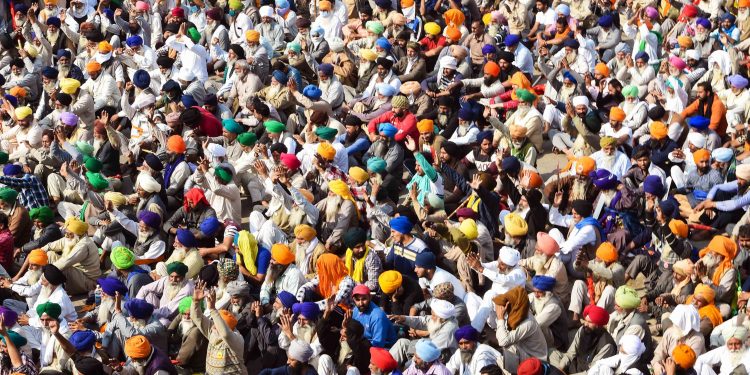New Delhi: As the ongoing farmers agitation entered its 31st day Saturday, a group of 40-farmer union leaders on Saturday announced that the government-farmer dialogue will resume with the sixth round of talks on Tuesday. The group reiterated that the repeal of the three contentious farm Acts and the Electricity (Amendment) Bill, 2020 was their “first and foremost” demand followed by all other issues.
The meeting will be held at 11 a.m. at Vigyan Bhavan in Central Delhi– the same venue where previous rounds of talks were held. Past five round of talks have remained inconclusive with the farmers adamant on the repeal of the three farm laws and the government saying it can amend the laws but withdrawal isn’t possible.
The Union Agriculture Ministry in an official letter also confirmed the resumption of talks mentioning a four-point agenda of the meeting that includes “modalities to be adopted for the repeal of the three Central farm acts; mechanisms to be adopted to make remunerative MSP (Minimum Support Price) recommended by the National Farmers’ Commission into a legally guaranteed entitlement for all farmers and all agricultural commodities; amendments to be made and notified in the ‘Commission for the Air Quality Management in National Capital Region and Adjoining Areas Ordinance, 2020’ to exclude farmers from the penal provisions of the Ordinance; and changes to be made in the draft Electricity (Amendment) Bill 2020 to protect the interests of farmers”.
All the farmers associations under the banner of All India Kisan Sangharsh Coordination Committee (AIKSCC) reiterated that “they are and have always been open to a sincere dialogue”.
After a meeting at Singhu border– a major protest venue at the Delhi-Chandigarh border– the AIKSCC reiterated that the “first and foremost demand of the farmers of India is to repeal of three farm Acts and the Electricity Bill, 2020, every other demand only follows this”.
Farmers have been agitating for years, under AIKSCC for “MSP at C2+50% for all crops and all farmers and waiver of debts of all farmers and landless agriculture workers, adivasis” Comprehensive Cost (C2) is the actual cost of production as it takes into account for rent and interest foregone on the land and machinery owned by farmers.
“But instead of solving these problems, the Modi government came up with the three ordinances and the EB 2020, which erodes all current benefits and securities and creates legal structure for control by corporates over farming processes, input sales, machinery, crop purchase, storage, transport, processing and sale of food. This will indebt the farmers further, suicides will rise, crops will become cheap while food will become costly and hoarding and black marketing will rise,” the AIKSCC said in a statement.
The Working Group of AIKSCC clarifies that all farmer welfare schemes are riddled with corruption and high non-performance.
In the ODF for example, AIKSCC said, 90 per cent of toilets made under the scheme are incomplete and in disuse and 95 per cent of all bank accounts created under Jan Dhan remain zero balance for most of the year.
The group alleged that PMKISAN is a pittance of Rs 16.32 per day, worth 800 gms of wheat flour and that PMFBY is a surreptitious scheme for transfer of farmers contribution and government farmer funds to district wise allocated insurance companies having provided with captive premium markets to earn. They earned Rs 2500 crores in 2017-18 and up to Rs 10,000 later.
IANS






































